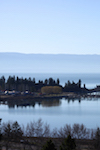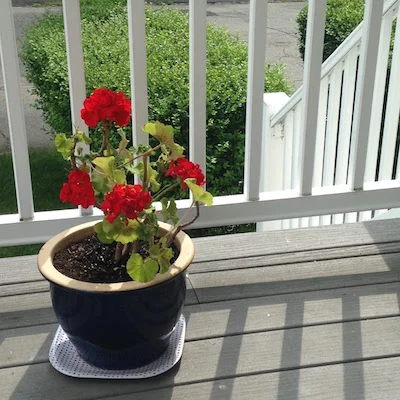I think back to this Paris trip often. How gracious it was of my mom to not demand the time with me. How focused I was on seeing as much as I could, when the most meaningful and fleeting thing was beside me. The best part of Paris didn’t end up being the Louvre or the Seine. The best part of Paris ended up the time I spent with my mother.
All in Place
Here I Sit
The act of writing itself carves out space for beauty in my life. This has always been true, but without the pretention of doing something big and important, I can relax into whatever shows up on paper—the mess and joy and struggle and grief and giggles of life. These are not the habits of a serious writer, of course. These are not the daily practices and evaluations needed to send a piece out into the world, just as letting the garden go to the wild won’t work as a long-term strategy. But this is what writing is to me right now, how I remember that writing starts with glimpsing into a world of magic, that it starts with, “Here I sit.”
The Full Spectrum
There is only one element I don’t want here in this jumble of life that is suddenly, surprisingly beautiful to me. Except sometimes I do want it, when the autism augments the good of who my daughter is without adding to her misery, that same misery we all know in one way or another during this life between Edens. What I want is for the autism to diminish, and if it can’t do that in her bodily experience, then at least it can grow smaller within the space it takes up in my imagining and understanding of this wonderful girl. I don’t yet know how to relegate it to its proper place, but I am hopeful. If my favorite house is the messy one now, then I can change and grow, too.
The Pecan Orchard
The Orchard stands at the end of the road. Waiting. Solid, robust, kindly, full of route and routine, of dank pockets where rain has padded the soil, of the sound of small, dry leaves shaken by the wind. Oh, all the stories I played there: it was a kingdom of the imagined, an arena of the kind of grace that allows for further creation—however misplaced, silly, phantastical, fleeting, and even unreal.
I’ve Loved This
I have not liked it here, and I’ve felt guilty about not liking it here: I know I should be grateful for a roof over my head, a safe and warm place to sleep, enough money to pay the rent and other bills. I know we were lucky to have six years in our previous place, and to leave it on good terms. Yet I’ve missed the old place and struggled to find reasons to love the new. It has not felt like home, though we’ve adjusted, done our best to make it work. But now, ironically, as we prepare to leave, I’m realizing what I have liked, even loved, about this place.
All Who Enter Here
When I was younger I came to this plot of land for years—almost 25 in a row—roaming the grassy shoreline, rowing around lily pads and tree stumps poking through the pond water, and running sweaty laps up and down Forshee Road. As an adolescent, I bloomed in the sensual soil of this place. I thrived during weeks like this one now, when I was the child vacationing here with my parents, brothers, and sisters. Year by year, we formed a kind of family liturgy, a joyful way of being together that transcended the reality of the modest little cabin and weedy pond.
What Light There Is
I have become, in the past few years, a seeker of the light. Now that it doesn’t pour over my shoulders each day, unasked and abundant, I’ve learned to keep an eye out for it. I can’t make it appear, but I still crave it, and I am learning to watch for—and appreciate—what light there is.
Testing Siri
What I love the most about Siri is if I make a mistake—a wrong turn, for example—she doesn’t tell me. She just finds a new path for me without saying, “re-calculating.” Sometimes, I’d make a mistake on purpose, just to see if Siri could find me and figure out what to do with me next. She always did. Only a few times has she told me to, “proceed to the route,” and I do, wondering only for a moment if her robotic female tone sounds mildly snarky and exhausted with me.
Vernal Equinox
Three daybreaks in a row, I spot a long-necked snowy egret, a thing I’ve rarely seen on Ocracoke during crowded summers. I will see a fourth and a fifth before this week is out. I’m cycling on the sound side of this windy barrier island, 20–25 miles out into the Atlantic Ocean off the coast of North Carolina. I’m here in late winter, in time for the run up to Vernal Equinox and to learn from the elegant waterfowl and her windswept empty beaches how to be and think and pray afresh—how to work and play in an uncluttered, unfettered manner.
A Shimmer of Possibility
I remember which bookcase it was on, where it was on the shelf, what the light was like. Maybe I opened it to a sentence that might as well have been in neon, a passage I admired for its construction and loved for its truth. I've kept the book all these years and reread it, or at least part of it, a few times (evidenced by the geological strata of marginal notes). And for decades I’ve kept a little sign on my desk with one of her sentences, printed in a font that now seems to scream 1990s: “Work is the backbone of a properly conducted life, serving at once to give it shape and hold it up.”
Hearth and Threshold: Thoughts on a Theology of Home
So what would it look like for us to hold in tension both this graced capacity for making a secure dwelling as well as the possibility of leaving this dwelling? For me, part of this tension can be answered by looking at the architecture of a house.
A Car with a View
The ring road was a real-life video game, a high-stakes bumper car ride. I opened my eyes as wide as I could, as if that would help me see better, scarcely daring to blink for fear of missing one of the Fiats or Ferraris zooming around me like moccasins whipping past a lazy water spider. There’s something of the primordial swamp about driving in Italy—it’s very much a sink-or-swim situation, wherein the fittest not only survive, but sprout scales, fins. Wings. I squared my shoulders and lowered my foot on the gas pedal.
Holy Island in Loch Derg
This very witness of love intertwines and melds with the aesthetical gift of Inis Cealtra: indeed, the beauty of these ruins forms their ecclesiastical lessons. The stones attest to the labor and handiwork of disciples long ago; arches and elegant stonework attest to the creativity of worship; moss, ivy, and grass attest to the wild edge of praise. These ruins teach us through their longevity, beauty, wildness, openness, emptiness, quietness. They teach us something about the heart of the Church—it is long-lasting, shared, and beautiful.
Small Things, Slow Work
To love our city and care about the arts and creativity has been about loving and caring for individual people. And I think for any of us it comes down to that. Loving a city and its people in general doesn’t mean a whole lot. Loving a city and its people in specific, however our callings lead us, means everything.
A Sojourn in Sweden
Twenty years ago this past summer I traveled to the land of my ancestors. A land I had heard about my whole life, a storybook country of lakes and forests and flaxen-haired princesses. Of blue and yellow flags and three golden crowns atop many a spire. It was “the old country” of my grandparents on both maternal and paternal sides. Surnames like Lundberg, Holmberg, Appelquist, Boquist, and Engwall wrapped my childhood in their soft sing-song melodies. And I was one small variation on that theme, about to join the main chorus.
You Are Here to Kneel
I decided that I was the wrong kind of person to visit a monastic order. I was too uncivilized and unlearned, too ornery and idealistic, and maybe even too Protestant. But during our final breakfast with Father Donovan, I scooped jewel-red currant jam I’d helped prepare onto homemade Irish bread and listened to the monk discuss theology, politics, and the proper method of a coffee press. I began to wonder if maybe I'm exactly the right sort after all.
On Honest Art
For a day we considered our deepest disposition, sons of Adam and daughters of Eve that we are: we compartmentalize, we believe one thing to be true and behave as if another thing is true, we say “This matters most!” and then live as if it doesn’t really. This tendency has profound implications, for learning, for labor, for love, for liturgy—for all of who we are, for all of how we live.
How do we begin to find our way to coherence? Can we even imagine a way of seeing and hearing that honestly connects what we believe with the way that we live?
 I don't notice the robin making her nest. Neither do I notice when she lays her eggs. I don't know how long she bides her time there, waiting for their hatching. After two weeks of rain, the kids and I come outside, squint in the sun, and find four tiny beaks stretching up from a nest on our meter box. The mama robin swoops in, drops in her food, and then flies to a nearby branch to keep watch. We are mesmerized.
I don't notice the robin making her nest. Neither do I notice when she lays her eggs. I don't know how long she bides her time there, waiting for their hatching. After two weeks of rain, the kids and I come outside, squint in the sun, and find four tiny beaks stretching up from a nest on our meter box. The mama robin swoops in, drops in her food, and then flies to a nearby branch to keep watch. We are mesmerized.
 It is the first morning of vacation in a friend’s condo. I am looking down on the condo’s private beach from my balcony. From way up here, everyone is small, no one too fat, too sexy, too weak, too old, or too young. They are all just specks of human beings swallowed by a vast dance of blurry sandbars beneath an undulating surf. I arrived last night in the dark and went to sleep. This morning, I try to unkink from regular life stresses. I keep telling myself it’s okay if my thoughts walk away from these relentless concerns. The ocean, meanwhile, forgets with ease, content with humming a tune of waves that massage the air like an oscillating fan, a white noise sound machine rising and falling, over and over, an unending breath-like soundtrack.
It is the first morning of vacation in a friend’s condo. I am looking down on the condo’s private beach from my balcony. From way up here, everyone is small, no one too fat, too sexy, too weak, too old, or too young. They are all just specks of human beings swallowed by a vast dance of blurry sandbars beneath an undulating surf. I arrived last night in the dark and went to sleep. This morning, I try to unkink from regular life stresses. I keep telling myself it’s okay if my thoughts walk away from these relentless concerns. The ocean, meanwhile, forgets with ease, content with humming a tune of waves that massage the air like an oscillating fan, a white noise sound machine rising and falling, over and over, an unending breath-like soundtrack.
 Hospitality is serving people and helping people who are in our home. We listen. If they stay in our home, I fix meals and prepare a bed and so forth for them. I read something about—I think it is Benedict's Rule of Hospitality—that there's a difference between serving and being a servant. When I'm serving, I'm in charge. If I'm a servant, you're part of it. If you want to do something to help me, I'll let you do it because that's allowing you in. You're not being in charge. I'm not being in charge.
Hospitality is serving people and helping people who are in our home. We listen. If they stay in our home, I fix meals and prepare a bed and so forth for them. I read something about—I think it is Benedict's Rule of Hospitality—that there's a difference between serving and being a servant. When I'm serving, I'm in charge. If I'm a servant, you're part of it. If you want to do something to help me, I'll let you do it because that's allowing you in. You're not being in charge. I'm not being in charge.































